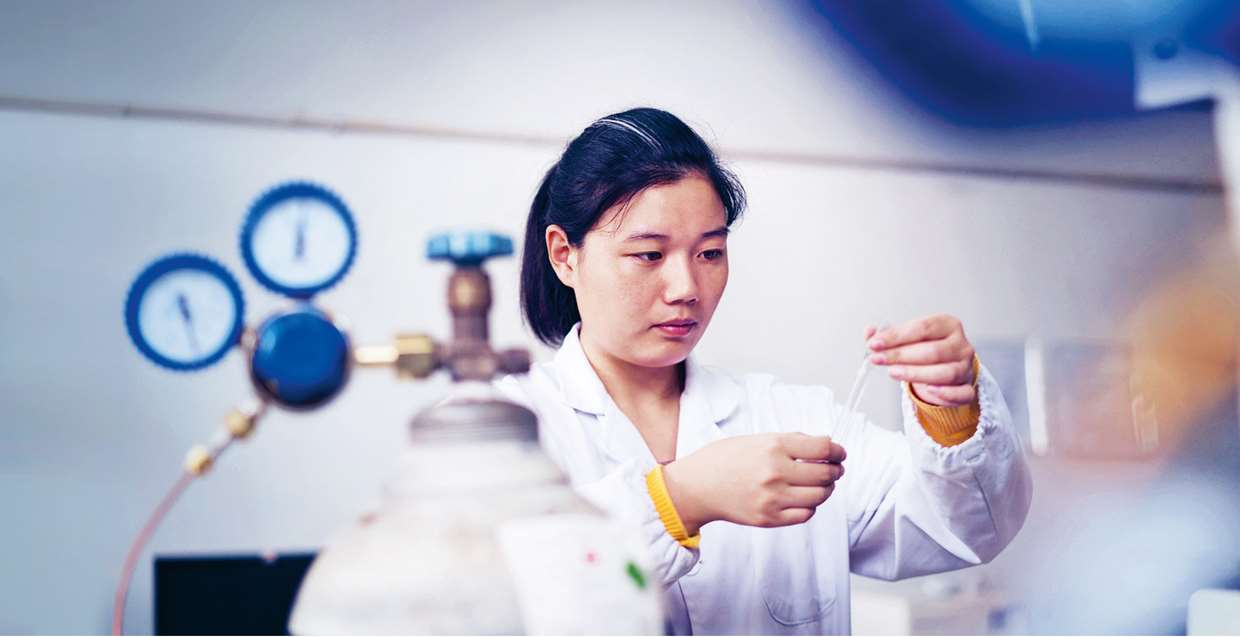Chemistry
Chemistry clearly improves EBIT margin and conducts strategic realignment

The strategic realignment of the Chemistry Division had a positive impact on its business development. Net sales were increased 8.8% to CHF 75.5 million and EBIT margin was substantially improved to 5.1%.
Strategy
The Chemistry Division conducted its strategic realignment in 2017 with a new arrangement of its operations worldwide. The division’s Chinese manufacturing facility now produces standard molecular sieves, while its US plant supplies high-value molecular sieves that are used in particular to purify air in the oxygen concentration process. The new production plant in Bosnia-Herzegovina, which was completed at the end of 2017, manufactures molecular sieve powders, chromatography gels and special zeolite products.
The division will move into its new Swiss site in Rüti in summer 2018. As well as providing a home for the division’s management, administrative and service functions, the Rüti facility will produce high-performance gels and deuterated products.
The highly specialized deuterated products segment will be further strengthened by the acquisition of the assets of Armar AG as of 1 March 2018. Armar is a manufacturer of deuterated products and a long-established Zeochem distribution partner. Armar’s activities will be integrated into the new Rüti operation.
Fertilizer production at the Uetikon site was discontinued in summer 2017, and the CU Deutero + Agro AG and Chemie Uetikon AG companies were merged into Zeochem AG. The Uetikon premises will be closed once the transformation is complete. The site, which was sold to Canton Zurich in 2016, will be handed over to the canton when the two-year lease on it that was included in the sale agreement expires. The canton plans to use the site to build a new secondary school. With its presence in Europe, Asia and the Americas, the Chemistry Division is excellently positioned to take full advantage of further growth opportunities.
Market environment
The adsorbents produced by the Chemistry Division are used in a wide range of fields from simple applications in double-glazing windows to highly complex separation procedures for pharmaceutical agents. The demand within these various segments and product groups showed very differing trends in 2017. One key business area is the energy sector, where molecular sieves are used to purify natural gas and ethanol. Here, with oil prices below USD 60 a barrel, the industry remained reluctant to invest in new facilities, and operators tended to defer the replacement of the molecular sieves in their existing plants.
The demand for molecular sieves for purifying oxygen remains high. These lithium-based products are used in industrial applications such as steel manufacture, but are also being increasingly used to purify medical oxygen. Special zeolites are also seeing growing demand from the construction, automobile and textile sectors, where they are used to eliminate unpleasant odours.
While demand in Europe showed little growth in view of the economic climate, the emerging markets − and Asia in particular − continued to show dynamic growth trends.
Business development
The Chemistry Division raised its annual sales for the fourth year in succession. Net sales were increased 8.8% to CHF 75.5 million, largely through organic growth. The absence of the fertilizer business in the second half of the year and the first-time full-year consolidation of ALSIO of China (which had been consolidated for a ten-month period in 2016) largely balanced each other out. The facilities for manufacturing high-value products in the USA were fully utilized, requiring capacity to be increased here through additional investments. All in all the division invested CHF 22.4 million in tangible fixed assets in 2017 (compared to CHF 22.9 million the previous year). The spending related to the purchase of land and the capacity expansion at the US site, the establishment of the new Zvornik plant and the investments in the new Rüti premises.
The transfer of the production of standard molecular sieves to China had a positive impact on costs, since the capacities required were already available. Thanks to this, and the impact of the higher sales volumes, the division raised its EBITDA for the year by 29.2% to CHF 7.3 million. Annual EBIT was also a substantial improvement at CHF 3.8 million, and EBIT margin rose from 2.3% to 5.1%.
The division’s workforce increased by 22 employees to 302 personnel. The divisional realignment entailed the elimination of 85 jobs in Uetikon, a process which will be completed in 2018. At the same time, 39 jobs were created at the new operation in Bosnia-Herzegovina. A severance benefits package has been provided for the Uetikon staff affected, and new options have been found for almost all the personnel involved.
Outlook
2018 will see the Chemistry Division focus on consolidating its new international structure, ramping up production at its new facilities and intensifying its sales activities. This in turn should deliver higher sales and a further improvement in operating results. The division plans total capital spending of some CHF 4.5 million in the course of the year, on items that will include a new groupwide enterprise resource planning (ERP) system to optimize the global coordination of business activities.
